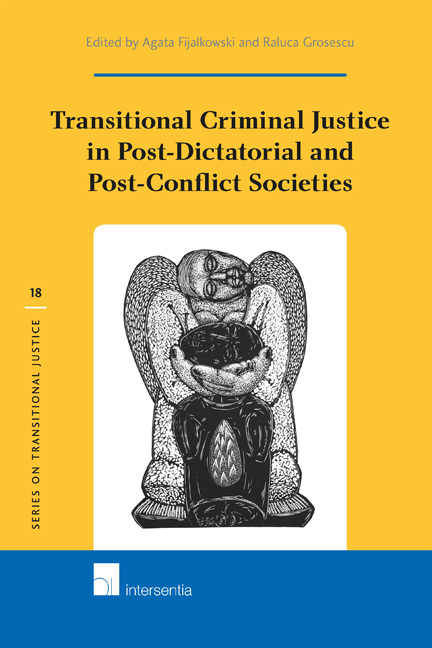Book contents
- Frontmatter
- Contents
- Introduction
- PART I CRIMINAL JUSTICE AS A METHOD OF DEALING WITH THE PAST: OPPORTUNITIES, STRATEGIES, AND LEGAL AND POLITICAL CONSTRAINTS
- PART II UNIVERSAL PRINCIPLES V LOCAL PECULIARITIES: THE RELATIONSHIP BETWEEN NATIONAL JURISDICTIONS AND INTERNATIONAL LAW
- Chapter 7 International Politics of Justice: The Political Underpinnings of the Emergence of an International Regime
- Chapter 8 Positive Complementarity: Fine-Tuning the Transitional Justice Discourse? The Cases of the Democratic of Congo, Uganda and Kenya
- Chapter 9 Punishing Mass Atrocities: Penological Developments in the Aftermath of the Rwandan Genocide
- Chapter 10 International and National Legal Assessment of Crimes Committed by the Communist Regimes: Lithuanian Case Study
- Chapter 11 Conclusions
- About the Authors
Chapter 7 - International Politics of Justice: The Political Underpinnings of the Emergence of an International Regime
from PART II - UNIVERSAL PRINCIPLES V LOCAL PECULIARITIES: THE RELATIONSHIP BETWEEN NATIONAL JURISDICTIONS AND INTERNATIONAL LAW
Published online by Cambridge University Press: 28 November 2017
- Frontmatter
- Contents
- Introduction
- PART I CRIMINAL JUSTICE AS A METHOD OF DEALING WITH THE PAST: OPPORTUNITIES, STRATEGIES, AND LEGAL AND POLITICAL CONSTRAINTS
- PART II UNIVERSAL PRINCIPLES V LOCAL PECULIARITIES: THE RELATIONSHIP BETWEEN NATIONAL JURISDICTIONS AND INTERNATIONAL LAW
- Chapter 7 International Politics of Justice: The Political Underpinnings of the Emergence of an International Regime
- Chapter 8 Positive Complementarity: Fine-Tuning the Transitional Justice Discourse? The Cases of the Democratic of Congo, Uganda and Kenya
- Chapter 9 Punishing Mass Atrocities: Penological Developments in the Aftermath of the Rwandan Genocide
- Chapter 10 International and National Legal Assessment of Crimes Committed by the Communist Regimes: Lithuanian Case Study
- Chapter 11 Conclusions
- About the Authors
Summary
This chapter is an attempt at reconstituting the emergence of the international mechanisms of criminal justice after the Cold War. It takes as its starting point the articulation between the fundamental norm of the modern system of states -sovereignty - and the corpus of human rights that addresses the regime formation of international criminal justice. This chapter focuses on the political, rather than the legal, aspects of this process. While it is difficult enough to conceptualise and to theoretically justify the link between sovereignty and the possibility for individuals to become subjects of international law, a further obstacle to the emergence of international criminal justice is the overcoming of the strategic interests of particular states, especially great powers, in establishing such a jurisdiction. International law is to a large extent politically negotiable: this is why this chapter looks into the political context that allowed for the creation of the ICC and at the same time to the transformation of the meaning of sovereignty in order to include obligations of the state.
INTRODUCTION
If a change of political regime often entails a re-evaluation of the recent historical past of a nation, there are cases in which this re-evaluation is brought about from the outside. Thus, transitional justice gains an international dimension. This dimension can occur either if the crimes perpetrated by a political regime affect nationals of other states, or if the successor regime lacks the will or capacity to bring such cases before justice, because ‘ideally, all crimes would be prosecuted by domestic courts’. Looking back, the Nuremberg trials are the first instances of this sort (although they might also be interpreted as ‘victors’ justice’). The political stakes surrounding the Cold War prevented the development of international criminal justice until the fall of the USSR, but during the 1990s, it gained a new impetus that led to the creation of the International Criminal Court (ICC) in 1999.
However, discussing international criminal justice compels us to take a number of precautions concerning the terminology itself, as well as its content. I would like, from the beginning, to point to the awkward sonority of the word ‘international’ in this context, since it generally refers to relations between the governments of states.
- Type
- Chapter
- Information
- Publisher: IntersentiaPrint publication year: 2015



